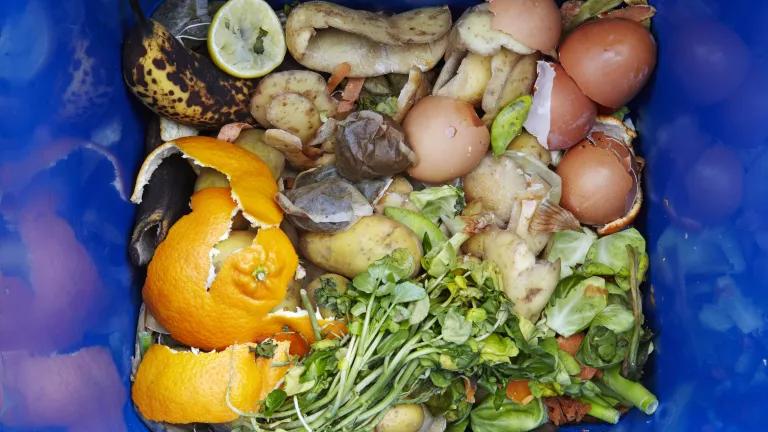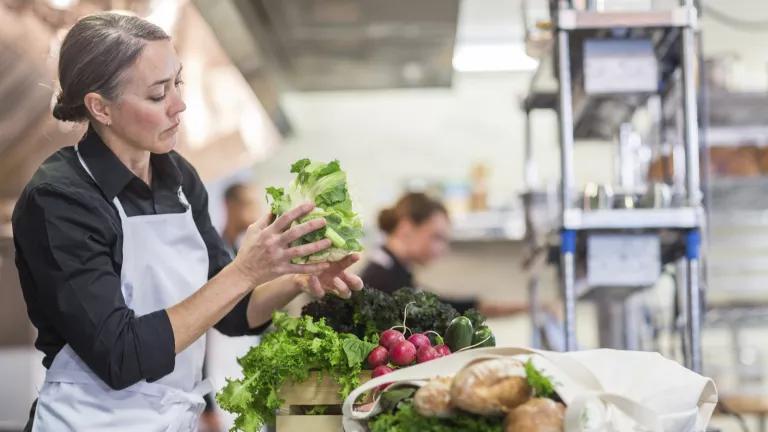Food Waste Solutions on the Menu at COP28
COP28 is a critical moment to take global action on food waste reduction.

Expo City Dubai, site of the UN Climate Change Conference COP28
COP28, for the first time ever, features a distinct theme of Food and Agriculture Systems.
The common tendency has been to undervalue food and agriculture solutions in climate change discussions. But food should be at the table. Our global food system is a top emitter of greenhouse gases, and 8-10% of the world’s emissions come from food loss and waste (FLW) across the food supply chain alone.
Fortunately, these emissions are something we have control over. We can mitigate most of them
A recent report from the U.S. Environmental Protection Agency (EPA), showed that if the United States had reduced landfilled food waste by 50% in 2015, we would have cut emissions five years later, in 2020, by the equivalent of the amount of energy powering 15 million homes in a year.
Addressing food waste can also have economic, environmental, and societal impacts. With food insecurity on the rise across the globe due to wars, climate change and diminishing social safety nets, we must stop wasting this critical resource.
COP28 will give parties a chance to collaborate and establish clear pathways for reducing food loss and waste and climate-warming emissions.
How might COP reduce global food waste?
Encouraging countries to include food loss and waste in Nationally Determined Contributions (NDCs):
To drive down emissions and keep global warming below the critical 1.5ºC, it is imperative that countries include food waste reduction in their NDCs and carve out tangible steps for addressing food waste. This is a massive opportunity: About 90% of nations that submit NDCs have not yet committed to reducing their food loss and waste. In the United States reducing food waste by 58 million tons annually could mean rescuing the equivalent of 4.3 billion meals for people in need each year, cutting annual U.S. GHG emissions by an estimated 109 MMT CO2E (the equivalent of the annual energy use of almost 14 million homes) and creating 60,000 jobs over the coming decade. To help realize these benefits and drive widespread adoption of solutions, the Biden-Harris administration should start by adopting a FLW goal in the U.S. 2030 NDC and account for food loss and waste in the stocktaking of progress towards the Paris Climate Agreement.
Emphasizing the urgency to keep food out of landfills and cut methane emissions:
Two years ago, at COP, 100+ countries signed the Global Methane Pledge to commit to reducing methane emissions; highlighting agriculture as a critical sector. By addressing food loss and waste, countries can get significantly closer to achieving the ambitious pledge. When food waste goes to landfills, it decomposes and creates methane, a global warming pollutant up to 80 times more potent than carbon dioxide. In the United States, municipal landfills are the third-largest human-generated source of methane--and food waste represents 58% of those emissions. The most effective way to prevent methane releases from landfills is to keep organic materials like food waste out of landfills, through prevention, rescue, composting, and other solutions. We are thrilled to see one such solution: the launch of the Lowering Organic Waste (LOW) Methane Initiative at COP, through which 40 subnational jurisdictions and their national government counterparts, including the U.S., aim to reduce at least 1 million metric tons of annual waste sector methane emissions well before 2030. It is imperative that the U.S., along with other countries, prioritize food waste prevention as the best way to reduce impacts on resources and reduce pollutants overall; but countries should also ensure that any existing emissions are captured through more effective landfill methane collection systems, better monitoring, and tighter regulations.
Calling for the financing of food waste solutions:
To bring solutions to fruition, we need investments up and down the food supply chain in things like cold storage, measurement technologies, composting infrastructure, and waste characterization studies. We know what it takes to end food waste and better manage our precious resources, but we need funding to implement them at scale. Released on December 5 at COP28, the “Reducing Food Loss and Waste – A Roadmap for Philanthropy” is a powerful guide for how philanthropic investment could turn the tide on food waste globally. According to ReFED, an annual investment of $18 billion can reduce food waste by 58 million tons each year and put us on a roadmap to keep food in the human value chain, reduce supply chain inefficiencies, and optimize food waste management practices. Wasting what we could be eating contributes to the climate crisis. Recognizing this and making it a global priority will help to unlock critical financial resources.
Urging countries to sign onto the Food Declaration at COP:
The COP28 Declaration on Resilient Food Systems, Sustainable Agriculture, and Climate Action recognizes the clear connection between food systems, agriculture, and climate change. We applaud the COP28 Presidency, the United Arab Emirates (UAE), who prepared the declaration and launched it at COP28 on December 1. It calls on leaders to integrate food and agriculture solutions into their NDCs, National Adaptation Plans (NAPs), and National Biodiversity Strategies and Action Plans (NBSAPs), and it has already been endorsed by 130 world leaders. By signing on to the declaration, countries can show leadership and a commitment to reducing global emissions from their food system.
All this is why COP28 is a critical moment.
It is critical for comprehensive climate action across all sectors including energy, transportation, food, and many others. If you are going to COP or attending virtually, make sure to participate in the food and agriculture sessions or visit the food systems pavilions, which signal a necessary shift in recognizing the global food system’s role in the climate fight. These discussions offer a unique opportunity for parties to commit to ambitious actions against food loss and waste, not only helping reduce emissions but also addressing food insecurity, promoting economic development, and ensuring environmental resiliency. With COP28 giving a platform for transformative solutions, the time to act for a more climate-resilient future of food is now.





